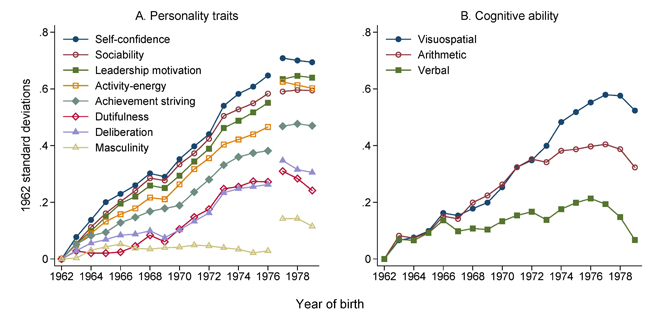Younger cohorts of conscripts are increasingly sociable

Personality traits such as self-confidence, sociability, and leadership motivation improve steadily across the birth cohorts of military conscript born in the 1960s and 1970s.

Finnish men’s perceptions of their own social skills, such as self-confidence, sociability, and leadership motivation, improve steadily across birth cohorts. There is a very clear difference between those born in the late 1970s and those born in the early 1960s.
Higher test scores in the standardized personality test administered to conscripts are associated with higher earnings later in life, which suggests that changes in these personality traits have economic significance.
A team of researchers analysed the results of personality tests administered to 420,000 men born between 1962 and 1976 who were enlisted in the Finnish Defence Forces.
Researchers measured the direction and significance of the changes in test scores by using the test scores to predict individual earnings at age 30–34. They find that the average personality traits of men born in 1976 predict earnings that are 12 % higher than those predicted by the average personality traits of men born in 1962.
Many earlier studies have documented a secular increase in intelligence test scores across birth cohorts. “We show that there is a similar trend in how personality traits evolve across birth cohorts”, says Matti Sarvimäki, one of the authors of the study, and a Senior Researcher at the VATT Institute for Economic Research.
The research, published this week in the Proceedings of the National Academy of Sciences, is significant because it is difficult to study long-term trends in personality traits due to lack of data on personality traits that is both representative of the wider population and measured consistently across successive birth cohorts. The Finnish Defence Forces test score data provides a unique opportunity for research due to Finland’s comprehensive conscription system (it covered 79 % of Finnish men born in the study period) and because the test remained unchanged throughout the period.
The research team consisted of two authors from the VATT Institute for Economic Research, Tuomas Pekkarinen and Matti Sarvimäki, and Markus Jokela from the University of Helsinki, Marko Terviö from Aalto University, and Roope Uusitalo from the University of Jyväskylä.
Research: Secular Rise in Economically Valuable Personality Traits. PNAS, published ahead of print in the week of June 5, 2017.
Further information:
Senior Researcher Matti Sarvimäki, VATT, +358 295 519 446
Matti Sarvimäki
Tuomas Pekkarinen
Labour markets and education
Press release
Press release

